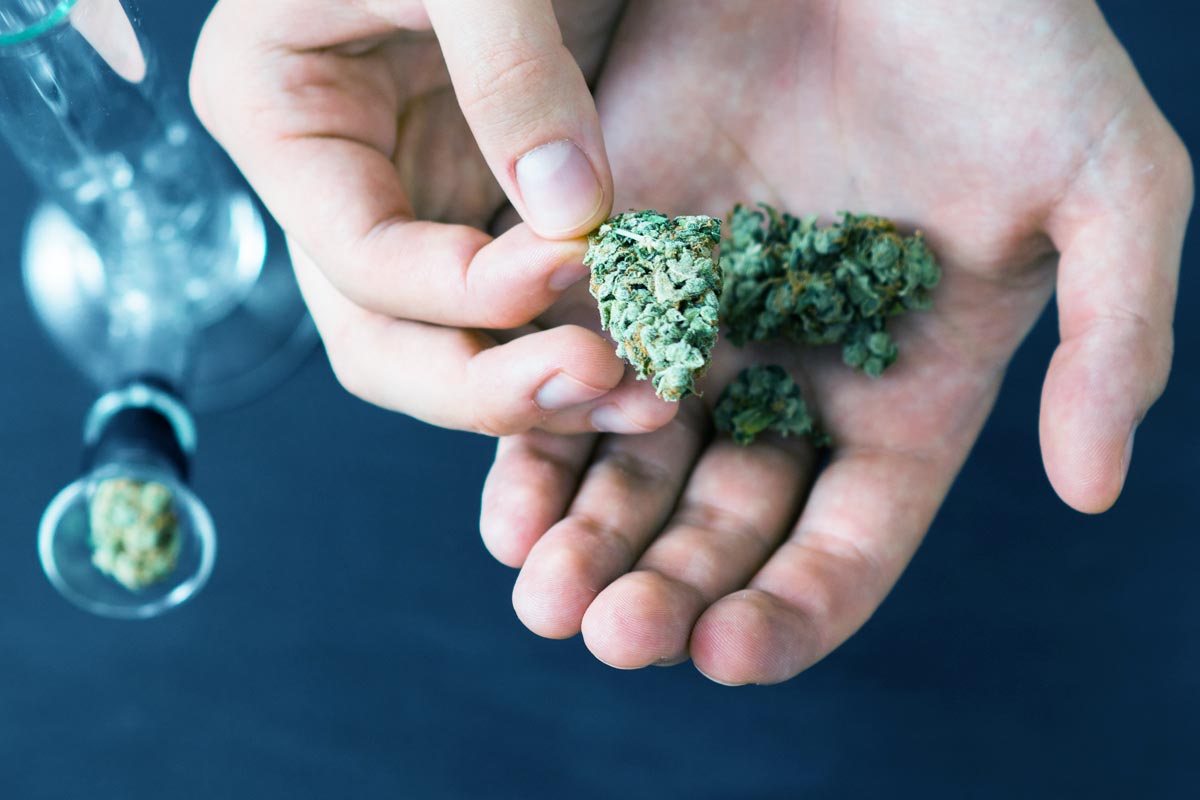 In 2020, an estimated 17.9% of the population or 49.6 million people use marijuana. That adoption, which exceeds any other intoxicant except for alcohol, is pushed by increasing acceptance of the drug, availability, and wide perception that marijuana is harmless. That leads to statistics like the fact that an estimated 70% of Americans have tried it at least once, compared to alcohol, which is at 85%.
In 2020, an estimated 17.9% of the population or 49.6 million people use marijuana. That adoption, which exceeds any other intoxicant except for alcohol, is pushed by increasing acceptance of the drug, availability, and wide perception that marijuana is harmless. That leads to statistics like the fact that an estimated 70% of Americans have tried it at least once, compared to alcohol, which is at 85%.
That acceptance also leads many to believe marijuana is safe for consumption during the day, when driving, and when at work. That usage results in persons who are legally intoxicated but who are working around machinery, driving vehicles, and responsible for activities and actions that may impact the health and wellbeing of others.
Most people who use marijuana do not do so at work. However, many do so in instances that impact their performance at work. E.g., smoking before leaving for work. Others smoke on lunchbreaks, too soon before shifts for the effect to fully wear off, or enough that the effects don’t fully wear off. As a result, one study published by CNBC showed that 1 in 10 Americans admitted to showing up high to work.
That rate of marijuana abuse is significant, but not likely something 10% of the population does regularly. Still, many do. And, the impacts of that are significant, both for the workplace and for the people smoking or using.
Marijuana is a mild intoxicant and a hallucinogenic, which causes change in response time, focus, attention, vision motor control, and verbal and auditory recall. This clearly impacts work, especially around the operation of motor vehicles, usage of heavy equipment, and even attention span. However, the exact effects of marijuana on work output are incredibly difficult to document. That’s both because different strains have different effects on the mind and body and because there is no federally legal way to study the impact of cannabis at work – because cannabis is still illegal on a federal scale.
However, cannabis does have significant effects on the short-term behavior and attention of people who smoke. E.g., studies show that people see:
In some cases, these effects map to higher THC count, dehydration levels, or even lack of sleep. However, despite significant studies going into strains that are more suitable for work, even high CBD and low THC strains often have these types of effects.
In addition, marijuana can have some long-term effects, especially for individuals with existing disorders. E.g., those with anxiety, schizophrenia, and paranoia are more prone to seeing increases in symptoms. Those side-effects can cause significant issues as someone with those conditions begins to smoke more or smokes regularly.
 It’s a well-recognized fact that marijuana interferes with your ability to use and operate motor vehicles and heavy equipment safely. That’s why much of the driving, oil, mining, and other industries involving heavy machinery still drug test regularly – even in states with legalized recreational marijuana. That’s important because cannabis slows the reaction time between seeing something and processing it as well as the reaction time between hearing something and processing it. You’re also less likely to be able to focus attention, no matter what strain you pick.
It’s a well-recognized fact that marijuana interferes with your ability to use and operate motor vehicles and heavy equipment safely. That’s why much of the driving, oil, mining, and other industries involving heavy machinery still drug test regularly – even in states with legalized recreational marijuana. That’s important because cannabis slows the reaction time between seeing something and processing it as well as the reaction time between hearing something and processing it. You’re also less likely to be able to focus attention, no matter what strain you pick.
In fact, using cannabis on the job while operating a machine or a forklift doubles your chance of being in an accident. And, 32% of all U.S. road accidents involve cannabis. While people consistently think they can drive and do so safely while high, that very often isn’t the case. Even if only because your reaction times are much lower in case someone else does something unsafe around you.
That’s why heavy equipment industries still largely test for cannabis use, even in states where recreational usage is legal. You can’t drive under the influence and you can’t operate a backhoe or a forklift that way either. It’s not safe to do so, therefore the workplace is in its right to have a zero-tolerance policy.
Most workplaces explicitly ban drinking or using another intoxicating substance other than specifically prescribed medication while at work. Most also require that you disclose any medication that might affect your ability to operate equipment if it becomes relevant. Therefore, in states where marijuana usage is legal, your workplace is still very likely to explicitly ban it. In fact, any organization that works across state lines and therefore falls under federal jurisdiction might be required to. Some states legalize cannabis usage but allow organizations to individually determine whether or not they allow people to smoke recreationally while under their employ. This means it may be legal to smoke recreationally in your state, you might never use at work, and your workplace might fire you anyway.
However, that also depends on the state. For example, Arizona explicitly bans local organizations from firing employees for cannabis usage unless they can prove that the employee used on the job. Therefore, you always want to review your state’s policy.
In addition, if you have a medical license to use cannabis, you might have additional leeway to use even at work. However, this, again, depends on local regulation. In addition, some industries like medical treatment and driving have zero tolerance policies imposed by Federal regulation and safety policies.
 If someone is consistently using at work, can’t stop using, and experiences extreme paranoia or even flu symptoms when quitting, they likely have a use disorder. In fact, if you’re using at work despite knowing that it’s an intoxicant and you shouldn’t be, you’re likely struggling with your cannabis usage. That’s important, whether you’re using to destress because your work is high pressure or you’re having trouble, just because you want to, or because you don’t see a difference between smoking cannabis and smoking tobacco. An estimated 8% of all cannabis users have a use disorder, although almost all of these are daily users. If you or a loved one is struggling, you’re not alone and there are ways to get help.
If someone is consistently using at work, can’t stop using, and experiences extreme paranoia or even flu symptoms when quitting, they likely have a use disorder. In fact, if you’re using at work despite knowing that it’s an intoxicant and you shouldn’t be, you’re likely struggling with your cannabis usage. That’s important, whether you’re using to destress because your work is high pressure or you’re having trouble, just because you want to, or because you don’t see a difference between smoking cannabis and smoking tobacco. An estimated 8% of all cannabis users have a use disorder, although almost all of these are daily users. If you or a loved one is struggling, you’re not alone and there are ways to get help.
Addiction treatment normally involves cognitive behavioral therapy, counseling, and behavioral therapy to help identify the underlying causes of addiction. From there, it works to help people replace seeking (drugs) behaviors with healthier coping mechanisms, to build resistance to cravings, and to build habits that contribute to a good life without drugs.
Cannabis is largely accepted as being safer than alcohol and in many respects it is. However, that doesn’t mean it’s completely safe or that you can use it at work. If you or a loved one is struggling with it, it’s important to take that seriously, to get help, and to seek out treatment.
Asana Recovery provides a full continuum of highly effective drug rehab and alcohol rehab programs. If you have questions for yourself, or your loved one, contact us today to speak in complete confidence with one of our experienced and caring addiction treatment team.
© Copyright 2024 Asana Recovery™ | All Rights Reserved | Privacy Policy
Asana Recovery
We firmly believe that the internet should be available and accessible to anyone, and are committed to providing a website that is accessible to the widest possible audience, regardless of circumstance and ability.
To fulfill this, we aim to adhere as strictly as possible to the World Wide Web Consortium’s (W3C) Web Content Accessibility Guidelines 2.1 (WCAG 2.1) at the AA level. These guidelines explain how to make web content accessible to people with a wide array of disabilities. Complying with those guidelines helps us ensure that the website is accessible to all people: blind people, people with motor impairments, visual impairment, cognitive disabilities, and more.
This website utilizes various technologies that are meant to make it as accessible as possible at all times. We utilize an accessibility interface that allows persons with specific disabilities to adjust the website’s UI (user interface) and design it to their personal needs.
Additionally, the website utilizes an AI-based application that runs in the background and optimizes its accessibility level constantly. This application remediates the website’s HTML, adapts Its functionality and behavior for screen-readers used by the blind users, and for keyboard functions used by individuals with motor impairments.
If you’ve found a malfunction or have ideas for improvement, we’ll be happy to hear from you. You can reach out to the website’s operators by using the following email
Our website implements the ARIA attributes (Accessible Rich Internet Applications) technique, alongside various different behavioral changes, to ensure blind users visiting with screen-readers are able to read, comprehend, and enjoy the website’s functions. As soon as a user with a screen-reader enters your site, they immediately receive a prompt to enter the Screen-Reader Profile so they can browse and operate your site effectively. Here’s how our website covers some of the most important screen-reader requirements, alongside console screenshots of code examples:
Screen-reader optimization: we run a background process that learns the website’s components from top to bottom, to ensure ongoing compliance even when updating the website. In this process, we provide screen-readers with meaningful data using the ARIA set of attributes. For example, we provide accurate form labels; descriptions for actionable icons (social media icons, search icons, cart icons, etc.); validation guidance for form inputs; element roles such as buttons, menus, modal dialogues (popups), and others. Additionally, the background process scans all the website’s images and provides an accurate and meaningful image-object-recognition-based description as an ALT (alternate text) tag for images that are not described. It will also extract texts that are embedded within the image, using an OCR (optical character recognition) technology. To turn on screen-reader adjustments at any time, users need only to press the Alt+1 keyboard combination. Screen-reader users also get automatic announcements to turn the Screen-reader mode on as soon as they enter the website.
These adjustments are compatible with all popular screen readers, including JAWS and NVDA.
Keyboard navigation optimization: The background process also adjusts the website’s HTML, and adds various behaviors using JavaScript code to make the website operable by the keyboard. This includes the ability to navigate the website using the Tab and Shift+Tab keys, operate dropdowns with the arrow keys, close them with Esc, trigger buttons and links using the Enter key, navigate between radio and checkbox elements using the arrow keys, and fill them in with the Spacebar or Enter key.Additionally, keyboard users will find quick-navigation and content-skip menus, available at any time by clicking Alt+1, or as the first elements of the site while navigating with the keyboard. The background process also handles triggered popups by moving the keyboard focus towards them as soon as they appear, and not allow the focus drift outside it.
Users can also use shortcuts such as “M” (menus), “H” (headings), “F” (forms), “B” (buttons), and “G” (graphics) to jump to specific elements.
We aim to support the widest array of browsers and assistive technologies as possible, so our users can choose the best fitting tools for them, with as few limitations as possible. Therefore, we have worked very hard to be able to support all major systems that comprise over 95% of the user market share including Google Chrome, Mozilla Firefox, Apple Safari, Opera and Microsoft Edge, JAWS and NVDA (screen readers).
Despite our very best efforts to allow anybody to adjust the website to their needs. There may still be pages or sections that are not fully accessible, are in the process of becoming accessible, or are lacking an adequate technological solution to make them accessible. Still, we are continually improving our accessibility, adding, updating and improving its options and features, and developing and adopting new technologies. All this is meant to reach the optimal level of accessibility, following technological advancements. For any assistance, please reach out to